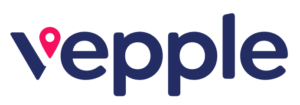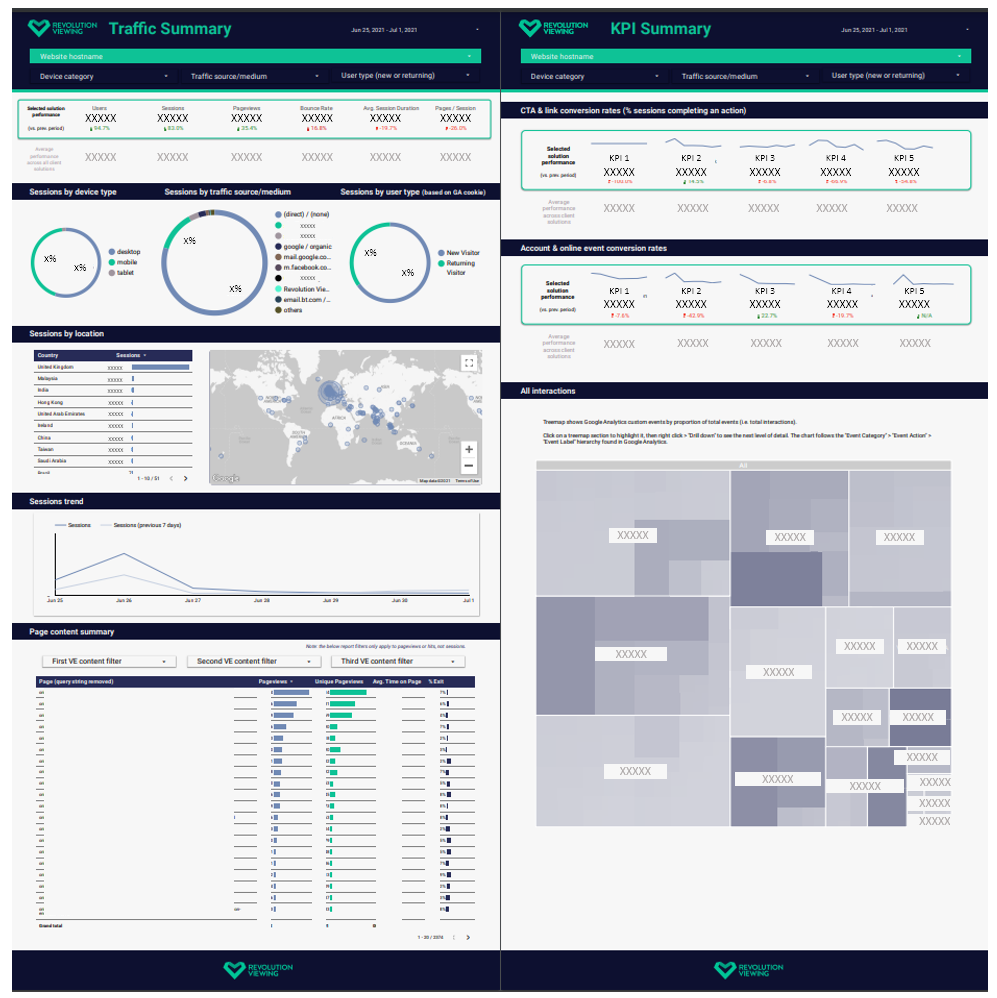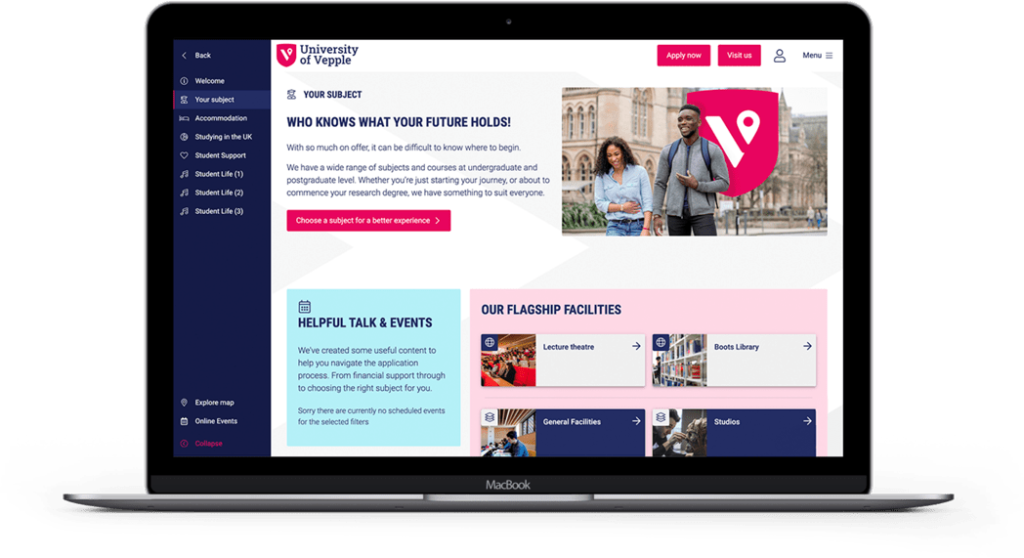

Vepple is an always on virtual experience platform created specifically for Higher Education student recruitment, with a focus on personalisation to increase conversion.
In developing and launching a virtual experience platform for several universities, Revolution Viewing identified the need for structured data analytics to support its growth.
They commissioned me to design and implement web analytics, assist with reporting, and uncover deeper insights about user engagement and conversion.
What did we do?
- Review of new user features, client strategy, and existing analytics reports.
- Bespoke digital measurement framework, covering stages in the prospective student journey.
- Mapping this strategic measurement framework to a concrete web analytics solution design.
- Designing and briefing a data layer to support analytics data collection.
- Multi-property setup of Google Analytics (GA) and configuration in Google Tag Manager (GTM).
- Looker Studio dashboard to summarise performance across all Vepple experiences.
- Deep-dive analysis to help evaluate Vepple, challenge qualitative research, provide insight to universities, and assist marketing efforts.
- Ongoing updates to the data layer and GA setup as Vepple features evolved.
- Ongoing consultancy and advice on the analytics setup and data analysis.

What was the outcome?
- Revolution Viewing and their university partners have been able to rely on a full suite of web analytics data, from the initial launch of Vepple through various feature updates.
- A rich set of data is being collected for Revolution Viewing’s own Universal Analytics and GA4 properties. Client universities have the additional option to integrate their own GA properties with Vepple.
- The analytics solution is future-proof due to the early inclusion of GA4 and strong GTM + data layer foundations.
- Summary Vepple performance can be viewed easily, via a dynamic dashboard that can be filtered by different universities and user journeys.
- Deep-dive analysis has uncovered key insights that showcase the strong performance of Vepple as a content and conversion platform for prospective university students. These insights have been shared with university partners and have featured in Vepple’s marketing.
Working with Daniel has been absolutely brilliant – he is structured, knowledgeable and has exceptional attention to detail. He’s also a lovely bloke which always helps!
Daniel helped us to understand how students are using our new university virtual experience platform, Vepple, and in turn, prove to our clients that the platform is delivering an acceptable ROI through an easy-to-use Looker Studio report. The team have really enjoyed working with Daniel and look forward to building on our working relationship as our platform grows.

Strategy & measurement framework
The project began with initial strategic immersion. We reviewed Vepple’s planned features and user journeys, alongside Revolution Viewing’s client strategy and the analytics for previous iterations of the virtual experience. This helped to understand the platform and main objectives more deeply.
The next step was to take this strategic information and produce a measurement framework.
The framework broke down the student’s experience of exploring universities into key “funnel” stages, as they related to Vepple and the university in question:
- “Attract”
- “Engage”
- “Prompt action”
- “Convert”
Against each stage, we defined KPIs, supporting metrics, user segments, and dimensions of interest. Most metrics were directly relevant to the Vepple platform, though the measurement framework also spanned different digital platforms and onward conversion journeys.
The purpose of the measurement framework was to ensure that our analytics solution captured all possible data that was strategically relevant, while keeping us focused in our data collection efforts. The measurement framework is also intended as a point of reference for ongoing monitoring and evaluation of the platform.

Google Analytics solution & setup
With a measurement framework agreed, we then moved on to the task of designing and implementing Google Analytics for a dynamic platform rich in different features and types of content.
First, we translated the measurement framework and existing reporting requirements into a comprehensive solution design. This document laid out all the precise parameters for our GA setup and doubled as an evolving reference/specification. The solution covered Universal Analytics and GA4, with setups for both Revolution Viewing and for client universities’ own data collection. This meant four complex GA solutions developed in parallel.
Once the solution design was completed and signed off, working closely with Revolution Viewing’s developers we moved into designing and briefing a data layer and Google Tag Manager setup. This would serve as the foundation for all our analytics data collection. We also had to ensure that we respected users’ cookie consent options.
We then implemented a wide range of GA tags to collect data for all key user interactions, content views, and conversions. As Vepple is constantly evolving, over time we went through several rounds of analytics tracking updates to ensure that we had a correct and up-to-date set of reports.
We also set up a daily export from Vepple’s master GA4 property to a Google BigQuery project. This helps to ensure that granular analytics data will be fully available in future and can be queried flexibly on demand.
Performance dashboard
Once we had the GA data flowing, there was a need to surface basic performance data and trends in a clear dashboard.
We used Google Looker Studio to create a bespoke, dynamic dashboard, showing KPI performance and with some drill down into supporting metrics. The dashboard could be filtered by different universities’ Vepple experiences, or other parameters such as user content selections, device types, traffic sources, etc.
We also included the ability to allow individual university performance to be easily benchmarked against the aggregate performance of all universities using Vepple.
Deep-dive analysis
With good foundations in place, we were able to carry out pieces of deeper analysis at key strategic points.

Once we had a few months of data, we completed a general review of Vepple’s performance in terms of engagement and conversion. We looked at traffic trends, performance around key events such as university open days, audience profiles and segments, and conversion rates for important interactions and conversion metrics. This analysis helped understand if there were any issues with the platform, begin to identify opportunities for improvements, and develop some further analysis questions.
Next up was a “research vs. reality” analysis to support a presentation by Revolution Viewing to university clients. This analysis looked at some specific insights from qualitative research, using our quantitative data to compare actual user behaviour to stated preferences and desired features. We also broke down Vepple engagement and content data by several detailed segments to provide additional information to university partners.
Our most recent analysis looked at how user engagement and conversion varied by use of content filters. These content filters are a key feature of Vepple, allowing prospective students to personalise their virtual experience by level of study, subject area, etc.

Conclusion
We have completed a full programme of analytics work in designing, setting up, and using rich interaction data for Vepple. The data and insights have been well used, offering Revolution Viewing a strong platform to monitor performance and deliver ongoing improvements, as well as highlight the benefits of using Vepple to deliver content.
In my view, Revolution Viewing have been an ideal client. They are clearly experts in their field, know their audience, have a deep knowledge of technology, and are great to work with. Crucially, they understand the value of analytics and how to get the most from their data. This provides great added value to universities and prospective students alike.
If you'd like to discuss how I can help your organisation with data analytics, you can find me on LinkedIn, or email me at [email protected]

